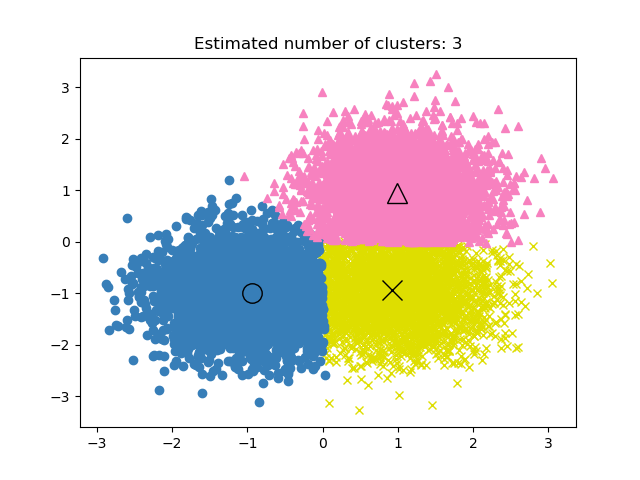Note
Click here to download the full example code or to run this example in your browser via Binder
A demo of the mean-shift clustering algorithm¶
Reference:
Dorin Comaniciu and Peter Meer, “Mean Shift: A robust approach toward feature space analysis”. IEEE Transactions on Pattern Analysis and Machine Intelligence. 2002. pp. 603-619.
import numpy as np
from sklearn.cluster import MeanShift, estimate_bandwidth
from sklearn.datasets import make_blobs
Generate sample data¶
centers = [[1, 1], [-1, -1], [1, -1]]
X, _ = make_blobs(n_samples=10000, centers=centers, cluster_std=0.6)
Compute clustering with MeanShift¶
# The following bandwidth can be automatically detected using
bandwidth = estimate_bandwidth(X, quantile=0.2, n_samples=500)
ms = MeanShift(bandwidth=bandwidth, bin_seeding=True)
ms.fit(X)
labels = ms.labels_
cluster_centers = ms.cluster_centers_
labels_unique = np.unique(labels)
n_clusters_ = len(labels_unique)
print("number of estimated clusters : %d" % n_clusters_)
number of estimated clusters : 3
Plot result¶
import matplotlib.pyplot as plt
plt.figure(1)
plt.clf()
colors = ["#dede00", "#377eb8", "#f781bf"]
markers = ["x", "o", "^"]
for k, col in zip(range(n_clusters_), colors):
my_members = labels == k
cluster_center = cluster_centers[k]
plt.plot(X[my_members, 0], X[my_members, 1], markers[k], color=col)
plt.plot(
cluster_center[0],
cluster_center[1],
markers[k],
markerfacecolor=col,
markeredgecolor="k",
markersize=14,
)
plt.title("Estimated number of clusters: %d" % n_clusters_)
plt.show()

Total running time of the script: ( 0 minutes 0.430 seconds)